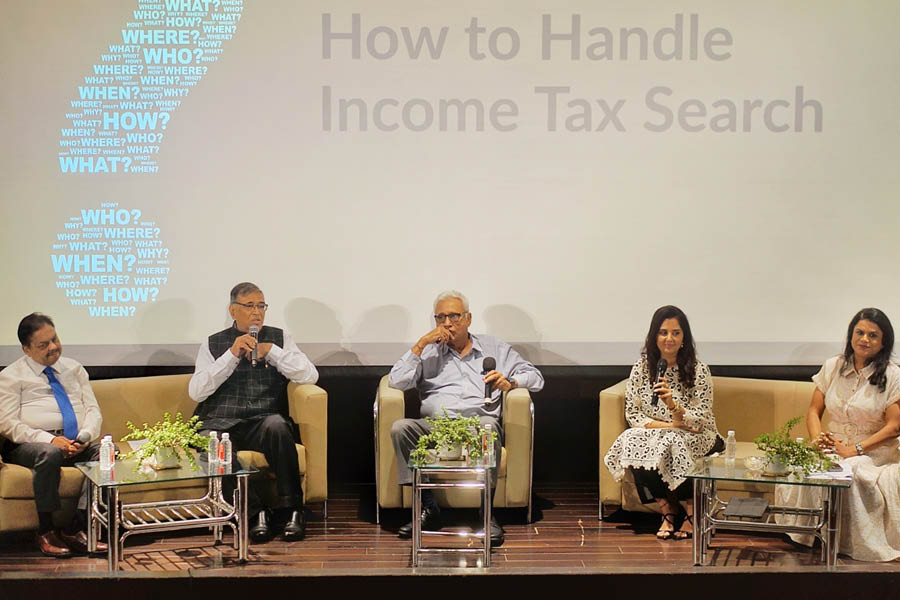Why are income tax raids conducted? What are one’s rights during a tax search? These are some of the critical questions answered during a seminar hosted by the Federation of Indian Chambers of Commerce and Industry Ladies Organisation (FICCI FLO) for its members on June 20.
The event at the International Management Institute (IMI) Kolkata had a panel of distinguished experts discussing the dos and don’ts of ‘How to handle an income tax search’.
The panel comprised Narayan Jain, tax adviser and author of How to Handle Income Tax Problems; R.S. Upadhyay, former director of the investigation wing and commissioner chief of income tax; Pramod Dugar; director at Indian Gem and Jewellery Creation; Shradha Murarka, FICCI FLO Kolkata chairperson; and was moderated by Dipti Khaitan, director of The BSS School and FLO committee member.

I-T search warrants are issued-based on the officials finding numbers that are out of place, it could be undeclared assets or it could even be falsified statements to show lesser income and profit.
While Shradha Murarka and Dipti Khaitan posed questions to the three panellists, the audience took notes and had some questions of their own when given the chance to interact with the panel of experts. To get the discussion underway, Khaitan asked what was the premise of an I-T raid, is it based on an individual and would only the said individual be investigated and searched or if they live in a joint family would each member’s belongings be searched by the investigating officers?
Given his experience in conducting I-T raids and also sending officers on various I-T search assignments, Upadhyay took up the question and said “When a search warrant is issued, it is usually based on a home address. In the case of a bungalow, it is the whole property and in case of flats, we cannot search an entire complex while investigating an individual. So it is just the person’s residence which would be a flat. To answer if each individual will be searched in case of a joint family the answer is yes, unless they live in the same house but all their assets are divided including having a separate kitchen etc, each part of the house will be searched,” said Upadhyay.
I-T search warrants are issued-based on the officials finding numbers that are out of place, it could be undeclared assets or it could even be falsified statements to show lesser income and profit. It is usually on this basis that an I-T search team would show up to your house with a search warrant to check your property to ensure you do not have any hidden assets and income.
With search teams usually turning up in the early hours of the morning, Murarka asked the panellists what should the ladies do if their husband is not at home when the officers arrive for the raid. How normally one can go ahead with their day, can the children go to school and can the family eat and pray at their regular timings were some of the other questions lobbed at the panellists.
Taking point on these questions, Jain said: “If there is no lady officer present you can refuse the search team’s entry till the point your husband returns. Say he’s gone for his morning walk and he will return shortly, you can tell the officers that I will not sign anything till my husband comes and I will not allow you to enter without a female officer present. They will accept your requests. As far as normal activities, the children can go to school but their bags will be searched to ensure they aren’t carrying any proof on their way out and my suggestion would be to pray extra on the day and you can go on with your normal meal timings, etc while the search is being conducted.”
While multiple other points were discussed including whether lawyers and accountants could be called home during the search, the panel agreed that it was not a unique request and they could be allowed in, as they could provide more clarity on the situation. As per the seized assets, not many would know this but they are returned after the investigation is completed. Cash, gold diamonds would all be returned once verified, said the panel.
With the audience being filled with ladies, some small business owners and homemakers, the question of personal jewellery was one that struck a chord with the audience.
Dugar brought in his expertise and said: “We know that it is very difficult to get the correct valuation of gold and diamond items and a lot of times their value is overestimated but the best thing to do with each item is to create a sort of catalogue with the valuation of the item as well as a note saying that it is a gift or purchased. Usually the main issues crop up in regards to family heirlooms, often an old diamond and gold or silver is taken to create new items which are gifted to daughters on the occasion of their weddings. These kinds of items are hard to value so to be on the safe side getting the remaking bill will help in such situations.”
When asked if private chats on phones and laptops will be used for evidence, Upadhyay said: “Our phones are the worst things, chatting about everything on text makes those admissible, so you can be questioned on every little text that you have sent or received. After a point it will feel like harassment, so it is better if you are discussing business to do it over a phone call rather than text because the number of hours you are questioned will just increase based on messages on various platforms. You can choose to say no comment on the messages but the process becomes unnecessarily long.”
After an hour-long discussion with several myths being broken down to empower the ladies of FICCI FLO, the panel discussion was closed off to allow for a question from the audience which was ‘How much undeclared money can we keep at home?’. Sometimes we keep money away from our husbands that we want to keep for personal reasons. How much is safe to keep without it being seized?” asked an individual in the audience.

‘How much undeclared money can we keep at home?’ asked a member of the audience.
The reply from Upadhyay was “Keeping anywhere between Rs 2 to 3 lakh in cash is fine but the bigger the amount the more likely it is to be seized so if you are keeping this money for savings, it’s better to put it in the bank in amounts of Rs 30,000 or 40,000. If you deposit too much more at one go, then even that amount will come into question.”
Leaving educated and empowered, the women felt safer knowing their rights during a tax search and how to tackle various issues in a given situation when the I-T sleuths come calling. From now on, these ladies will feel safer about their jewellery and cash assets at home knowing exactly how much gold, diamonds and cash they can keep and how to create lists of possessions so that the jewellery which they are often emotionally connected to, do not get seized.


